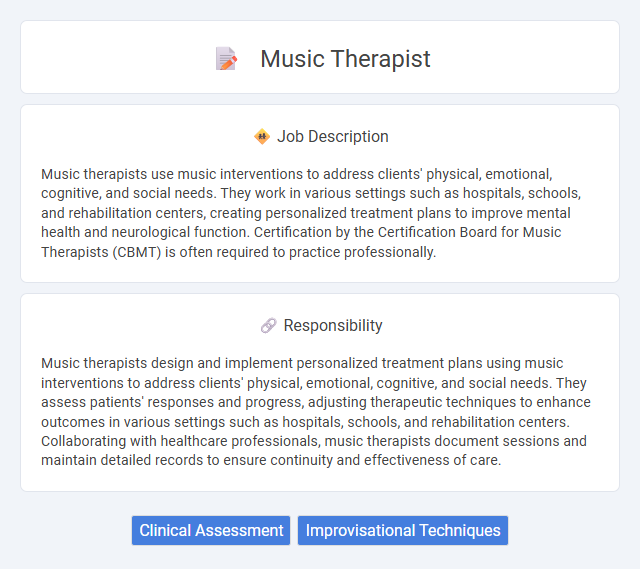
Music therapists use music interventions to address clients' physical, emotional, cognitive, and social needs. They work in various settings such as hospitals, schools, and rehabilitation centers, creating personalized treatment plans to improve mental health and neurological function. Certification by the Certification Board for Music Therapists (CBMT) is often required to practice professionally.
Music therapists likely work best with individuals experiencing emotional, cognitive, or physical challenges such as anxiety, depression, trauma, or developmental disabilities. People with strong empathy, patience, and a passion for both music and mental health may find this career especially suitable. Those who struggle with interpersonal communication or adaptability might find the demands of this role more challenging.
Qualification
Music therapists typically require a bachelor's degree in music therapy from an accredited program, which includes coursework in psychology, music theory, and clinical training. Certification from organizations such as the Certification Board for Music Therapists (CBMT) is essential to demonstrate professional competency and eligibility for licensure. Advanced roles may require a master's degree and experience in specialized fields such as neurological rehabilitation or pediatric therapy.
Responsibility
Music therapists design and implement personalized treatment plans using music interventions to address clients' physical, emotional, cognitive, and social needs. They assess patients' responses and progress, adjusting therapeutic techniques to enhance outcomes in various settings such as hospitals, schools, and rehabilitation centers. Collaborating with healthcare professionals, music therapists document sessions and maintain detailed records to ensure continuity and effectiveness of care.
Benefit
Music therapists likely offer significant benefits for mental health by using music interventions to improve emotional well-being and reduce anxiety. Their work probably enhances communication skills and social functioning in individuals with developmental or neurological conditions. The therapeutic use of music may also promote relaxation and pain management, contributing to overall quality of life.
Challenge
Music therapist roles likely involve navigating challenges related to addressing diverse patient needs and emotional complexities through tailored musical interventions. They may face the difficulty of adapting therapy techniques to suit varying cognitive and physical abilities while maintaining patient engagement. The probability of encountering situations that require creative problem-solving and patience is high, given the personalized nature of their therapeutic work.
Career Advancement
Music therapists can advance their careers by obtaining specialized certifications such as the Board Certification in Music Therapy (MT-BC) and pursuing graduate degrees in clinical or educational music therapy. Gaining experience in diverse settings like hospitals, schools, or rehabilitation centers enhances professional growth and opens leadership roles such as program director or clinical supervisor. Engaging in research, presenting at conferences, and publishing in academic journals also contribute to career progression and recognition in the field.
Key Terms
Clinical Assessment
Music therapists perform clinical assessments to evaluate clients' cognitive, emotional, and social needs using standardized tools and observational techniques. These assessments guide the development of individualized treatment plans that integrate music-based interventions to address physical, psychological, and developmental challenges. Ongoing evaluation during therapy sessions measures progress and adjusts therapeutic goals to maximize client outcomes.
Improvisational Techniques
Music therapists utilize improvisational techniques to facilitate emotional expression and cognitive development in clients across diverse populations, including those with mental health disorders, neurological impairments, and developmental disabilities. These techniques involve spontaneous musical creation, enabling therapists to tailor interventions dynamically and promote non-verbal communication and social interaction. Research indicates improvisational methods in music therapy enhance neuroplasticity, reduce anxiety, and improve mood regulation in therapeutic settings.
 kuljobs.com
kuljobs.com